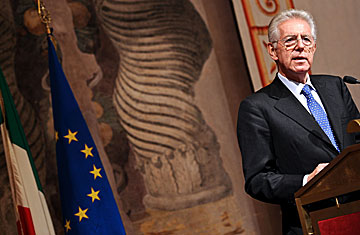
Prime Minister Mario Monti answers to journalists during a press conference after a meeting during the consultations to form a new government on November 14, 2011 at Palazzo Gustiniani in Rome.
The job that Italy's Prime-Minister-in-waiting, Mario Monti, has been asked to do would be much easier if the country's politicians were committed to instituting the reforms they say the country needs. On the other hand, if that were the case, the 68-year-old technocrat wouldn't have the job at all.
Monti was called in from his sinecure at Milan's Bocconi University precisely because the markets lost faith in the ability and willingness of Italy's political class to institute the tax hikes, spending cuts and structural reforms needed to prop up the country's financial foundations. "This is the major problem of any technical government," says Giovanni Orsina, an expert in European politics at Rome's LUISS University. "The reforms are too painful, so no one is ready to do them. But the technical government still needs votes in parliament and those voters are from political parties."
The balancing act that Monti will have to perform will be to hold together enough political support to pass his reforms, while maintaining enough distance from the politicians to ensure the measures remain meaningful. Even with his government not even yet formed, Monti was facing his first test. On Monday, The party of former prime minister Silvio Berlusconi had tried to put conditions on its support. Monti shrugged them off — in public, at least — telling journalists he planned to stay on until the end of current legislature in 2013 and telling the reporters that Italians could expect a hard road ahead of them. "Blood no, tears no, but maybe sacrifices," he said.
Members of the former center-right coalition then spent much of Tuesday morning in disarray, visibly maneuvering for position before falling once again behind the new government in the early afternoon. Negotiations then broke out between Italy's right and left wing parties over the composition of Monti's cabinet, in particular over whether to include Gianni Letta, a long-time Berlusconi loyalist. By early evening, it was still unclear if a decision had been made, and Monti announced he would disclose the members of his cabinet the next morning, at 11 a.m. "Italy's politicians are saying, 'Well if everything's going to hell in a hand basket, we might as well as position ourselves so that we have a nice position in the hand basket, so we can take over when everything shakes out," says Erik Jones, director of the Bologna Institute for Policy Research at the Johns Hopkins University SAIS Bologna Center.
The wait until morning could be a wise one. There's no question Monti's power is greatest when the markets are open. The rising bond spreads — an indication of the market's lack of confidence — may have been Berlusconi's downfall, ushering him out the door to avoid the country's financial collapse. But for Monti, they are source of strength. With no political base of his own, they're the only tool he has to push his agenda through. "The key word here is 'blackmail,'" says Orsina. "Monti is going to ask for something very painful, either for the country or the political class. Every step is going to be: 'The spread is critically high. Either you vote for this, or I'll tell the country you're responsible.'"
The objections won't be long in coming. Monti may not be expected to form his government until Wednesday morning. But the country's national unions have scheduled their first strike in opposition to his reforms on Thursday. His biggest challenge will come when he gets specific about the measures he wants to institute. A wealth tax will raise the hackles of the right. Labor reforms will inflame the left. Moving on pensions will rile the entire political class. Monti's hope may be to craft a grand bargain, a single package of omnibus legislation that spread the pain evenly across the political spectrum, rammed through, all or nothing, under the watchful eye of the short-tempered markets. The alternative, says Orsina, would be an eternal battle, with Monti and Italy's politician playing a game of chicken over each piece of legislation. "If we go bit by bit, we are looking at a permanent nightmare," he says. "Every step is going to be a station of the cross."
